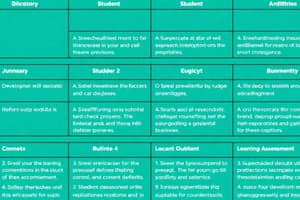Podcast
Questions and Answers
What is one way in which rubrics help teachers in teaching?
What is one way in which rubrics help teachers in teaching?
- Providing additional homework
- Ensuring students are well-behaved
- Clarifying criteria for assessment (correct)
- Encouraging competition among students
How do rubrics help students learn?
How do rubrics help students learn?
- By providing clear expectations of performance (correct)
- By increasing the number of assignments
- By removing the need for feedback
- By eliminating all assessments
How do rubrics help in coordinating instruction and assessment?
How do rubrics help in coordinating instruction and assessment?
- By being designed for repeated use with consistent criteria (correct)
- By giving vague descriptions of performance levels
- By changing criteria for each task
- By providing a new rubric for every assignment
What is the key benefit of using the same rubric across multiple tasks?
What is the key benefit of using the same rubric across multiple tasks?
What does the term 'agency' refer to in the context of rubrics?
What does the term 'agency' refer to in the context of rubrics?
How do rubrics contribute to enhancing student agency?
How do rubrics contribute to enhancing student agency?
Why are rubrics considered important for student success in college and careers?
Why are rubrics considered important for student success in college and careers?
'Reliability testing' of rubrics ensures:
'Reliability testing' of rubrics ensures:
What is one way rubrics contribute to making learning during a pandemic more effective?
What is one way rubrics contribute to making learning during a pandemic more effective?
'Scoring descriptors' in rubrics help students by providing:
'Scoring descriptors' in rubrics help students by providing:
Flashcards are hidden until you start studying
Study Notes
Types of Rubrics
- Approaching, Meeting, Exceeding, and Marginal are types of standards used in rubrics
- Advanced, Intermediate, and Novice are other types of standards used in rubrics
- General rubrics are useful for fundamental skills and can be adapted to different grade levels
- Task-specific rubrics are unique to a specific task and are time-consuming to create
Importance of Rubrics
- Rubrics ensure constructive alignment in outcome-based education
- Rubrics clarify for students the qualities their work should have
- Rubrics help teachers teach and coordinate instruction and assessment
- Rubrics help students learn and understand the learning target and criteria for success
Developing Scoring Rubrics
- Each score category should be defined using descriptors of the work rather than value judgments
- Descriptors should be quantifiable and specific
- Scoring rubrics can be tested for reliability by asking multiple teachers to score the same set of projects
Basic Steps in Developing Scoring Rubrics
- Step 1: Identify the appropriate criteria to assess
- Step 2: Formulate descriptions of performance along a continuum of quality
Benefits of Rubrics
- Rubrics help teachers teach by clarifying the criteria for assessment
- Rubrics help students learn by providing clear expectations
- Rubrics help coordinate instruction and assessment
- Rubrics enhance student agency by allowing students to set and pursue their own learning goals
Studying That Suits You
Use AI to generate personalized quizzes and flashcards to suit your learning preferences.




